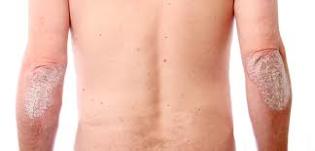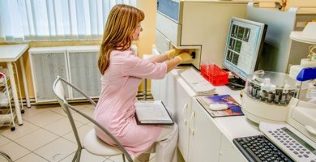Psoriasis - non-infectious disease of the skin, which is expressed in the education red peeling spots, covered with spicy silvery scales. As a general rule, the psoriasis develops in young people of 20 to 30 years. The disease is not a threat to the life of the person, however, called the serious psychological suffering of the nature, until social isolation.

The cause of the disease
Causes of psoriasis, today, up to the end are not identified. There are some factors that are associated with the occurrence of psoriasis. However, by themselves, these factors are not able to cause psoriasis, only in combination with others, can serve as an impetus to the development of this pathology:
- the genetic predisposition;
- the reduction of the protective properties of the organism;
- mismatches psychoemotional;
- pathology of the endocrine system.
It is assumed that the psoriasis can be the consequence of an imbalance in the functioning of the immune system. In the thickness of the skin to accumulate a large amount of T lymphocytes, which leads to the chronic inflammation of the affected areas. Histologically, psoriatic material confirms the presence of a high concentration of immune cells in areas infested by you to confirm immunological factor in the development of psoriasis.
The genetic predisposition to psoriasis confirmed the presence of mutations at various locations of dna. These areas are responsible for the development of immune cells the T-lymphocytes. The rupture of these areas can lead to the development of psoriasis. Therefore, if the parents suffer from psoriasis, the risk of developing this pathology in the child is 50% and even higher. Scientists have linked the development of psoriasis as in adults with mutations in certain genes.
Also the cause of development of psoriasis can be stress, which leads to the exacerbation of the symptoms of the disease. Stress disorder may trigger the release of hormones in the blood, which leads to a series of biochemical reactions, which in turn contribute to the appearance of different skin rashes.
The study of the etiology of psoriasis has shown that many of the sick there is a violation by the endocrine system and the sexual system, in addition, may result in a violation of the education processes of the pigmentation.
One can also mention the ancillary of the factors that favor the development of psoriasis: the ecology, the injury, the imbalance of power, the bad conditions of daily life, of the violation of the fundamentals of hygiene.
You can say that psoriasis is hereditary some doubts: in your development involved the whole complex of earlier causes.
The symptoms of the disease and its types
The psoriasis have some of the specific symptoms that allow to identify and diagnose this disease. When psoriasis will develop three characteristic of state:
- "wax" of the stain, which you try to scratch with the nail, exfoliating scrub, but for its similar consistency to the wax and stearin;
- the bright red of the surface that is formed after the separation of scales and platelets. Generally referred to as the terminal of a film;
- a very characteristic sign of psoriasis is a symptom of the "bloody dew". If you scraped off all the scales and plates on the surface of the skin, will lead small bloody point similar to the drops of dew.
Often psoriatic eruptions localized to the area of the flexion of the larger joints, in the area of the armpit, the scalp, in the groin, under the breasts, in the nail. The disease begins with the appearance of small pasta symmetric rashes, and then they melt into a large conglomerate, occupying large areas of the skin. The itching is not tolerable, and the office of return causes the appearance of the "bloody dew".

The diagnosis of psoriasis, it causes some complexity, as there are many types of this disease. Psoriasis has the following forms:
- vulgar (ordinary psoriasis);
- the psoriasis plaques;
- pustular psoriasis;
- psoriasis bending of the surfaces;
- the map of the psoriasis or in the form of drops.
Each type of psoriasis has its own code of international classification of diseases (icd-10). Each disease type has its signs, symptoms, and causes.
The treatment of psoriasis
The treatment of psoriasis represents a greater difficulty, since the disease is chronic during such temporary remissions. However, in our time, can significantly improve the state of the patient by the reduction of the clinical manifestations. The psoriasis treatment is comprehensive of common usage of the medication therapy, local medication therapy, the application of methods of physical therapy, and immune modulators.
In the first place, are used topical medications for external use. In the composition of such drugs include substances that contain:
- Glucocorticosteroid hormones, which are capable of preventing actively the division of the cells of the skin, and reduce the inflammatory phenomena, itching of the skin and depression of the immune system.
- Medications with vitamin D, the efficiency of which is manifested in the department of the ultraviolet radiation.
- The prepared activated carbon in zinc, which quickly resolve itchy skin and the redness of the epidermis.
For the system (in general) the treatment of psoriasis apply:
- Corticosteroids, which eliminate the symptoms of inflammation and regulate the metabolism.
- Cytostatic prevent the uncontrolled division of cells.
- The immunomodulators to correct the dysfunction in the functioning of the immune system.
- Medications medications that treat the symptoms of the disease: the foci of inflammation and itching, without affecting the cause of the disease.
Physiotherapy encompasses a series of procedures:
- Puva-therapy. This method consists in the use of photoactive chemicals that are used in conjunction with the long-wave ultraviolet radiation.
- Hirudotherapy. The use of leeches for the treatment of psoriasis, which improve the reflux of the blood.
- The cryotherapy. The method consists in the immersion of the sick in a few minutes in a chamber of very low air temperature. This method helps to eliminate effectively the manifestation of the foci of inflammation and dramatically reduce the itching.
The treatment of psoriasis popular methods, sometimes gives good results. Before you begin the treatment make sure that requires the consultation of a doctor dermatologist. The doctor should be informed of the treatments and totally approve it.
The complication and the prevention of psoriasis
The complications of psoriasis is manifested severe diseases that are difficult to treat: psoriatic arthritis, pustular psoriasis and psoriatic erythroderma. The prevention of the disease includes tonic measures:

- spa-spa therapy;
- a balanced diet;
- the healthy sleep;
- sanitation of chronic foci of infection;
- compliance with rules of hygiene;
- moderate physical activity.























